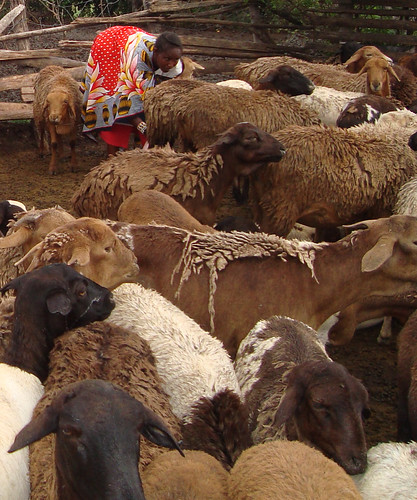Research groups at the International Livestock Research Institute (ILRI) are helping Maasai livestock herders in East African to retain their native 'hairless' (non-wool producing) red Maasai sheep, which are genetically resistant to infections with gastro-intestinal worms (photo credit: ILRI).
Half of the world's livestock herders live with their animals on the vast rangelands of Africa, which comprise half of Africa's surface. Herders have always adapted to variable weather, but over the next 50 years, pastoralist areas will face more and more changes.
What’s the future for Africa’s 50 million livestock herders who live on lands too marginal for cropping as our climate changes, becomes less predictable, heats up? How can scientific research help remote pastoral communities?
Among the poorest of the world’s poor, herders supply milk and meat not only for themselves but for large numbers of other poor people. Although their animals produce few of the greenhouse gasses harming the earth, these people will be among those most hurt by the climate changes we expect.
Population growth and land degradation are already causing problems over much of the continent’s traditional rangelands. Many herders, having lost all their animals to droughts, are facing the end of their way of life.
Research-based approaches for adapting to climate change, however, offer options that can help herding communities sustain at least some aspects of their pastoral livelihoods.
These options include:
- using satellite imagery to provide the first-ever drought insurance for pastoral herders in Africa's remote regions
- cross-breeding an indigenous disease-resistant sheep breed kept by Maasai communities with higher-producing exotic sheep to get the benefits of both
- helping communities shift from keeping grazers, such as cattle and sheep, to browsers, such as camels and goats
- supporting pastoralists to take advantage of local opportunities, such as shifting from herding ruminant animals to raising fish in ponds.
The experiences in this film, alongside other initiatives will be presented by Mario Herrero, a scientist with ILRI, at the 2010 United Nations Climate Change Conference in Cancun, Mexico from 29 November to 10 December 2010, to show how ILRI is applying research to help livestock-based communities cope with the effects of climate change.
Watch this new 10-minute ILRI film, Heat, Rain and Livestock: Impacts of Climate Change on Africa's Livestock Herders, to find out more.
See more of ILRI's films.
Find out more about the 2010 United Nations Climate Change conference.
See related article: New partnership launched to keep climate change from crippling food production in Africa and Asia, 19 November 2010.


You are doing great work keep it up for food sustainability.Bsc(Biotechnology,Msc biotechnology conti..) Available if an opportunity arises.thanks.